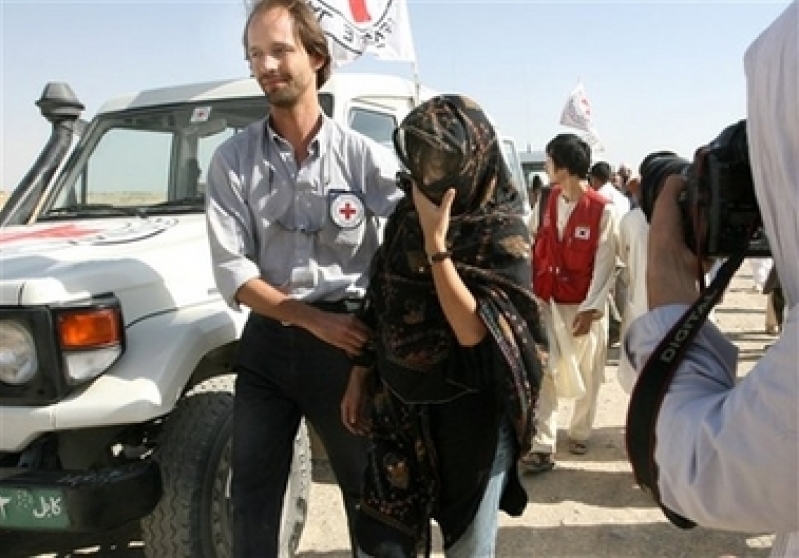
The Taliban released four more South Korean hostages Wednesday following the release of eight earlier in the day, bringing the militant group only seven away from fulfilling its promise to release all its captives.
The third set of hostages was released on a main road about 30 miles from the city of Ghazni as dusk approached, according to an Associated Press reporter who witnessed all three of Wednesday’s handovers.
The four freed hostages – one man and three women – brings the total to 12 of hostages released today and was preceded by the initial release of three women in the village of Qala-e-Kazi followed several hours later by the release of four women and one man in a desert close to Shah Baz.
“They seem – after six weeks in detention – very much relieved, which is a natural reaction after an extremely stressful experience,” said Greg Muller, a representative of the International Committee of the Red Cross to Agence France-Presse.
“But physically they seem in good shape,” he added.
South Korea identified the first three released women as Ahn Hye-jin, Lee Jang-ran and Han Ji-young, and the one male in the second set has been identified as Koh Se-hoon. The identities of remaining freed hostages in the second and third sets, most of whom covered their faces with their headscarves, were not immediately revealed.
None of the 12 said anything to reporters and all were released into the care of officials of the International Committee of the Red Cross.
It has been well over a month since the Taliban militants abducted the original group of 23 South Korean Christian volunteers on July 19 – the largest abduction of foreigners in Afghanistan since the fall of the Taliban regime in 2001. During that period, two male hostages have been killed – the leader of the group, Bae Hyung-kyu, who was found dead on July 25, and 29-year-old Shim Sung-min, whose body was found July 30. Prior to the latest releases, two females – 37-year-old Kim Kyung-ja and 32-year-old Kim Ji-na – were freed on Aug. 13.
Wednesday's releases took place a day after the Taliban and South Korea struck a deal in which Korea promised to withdraw its 200 troops from Afghanistan by the end of the year and to block South Korean Christian missionaries from working in the country. The rebels had reportedly foregone their original demand for a prisoner exchange.
In South Korea, family members shed tears of joy Tuesday upon hearing announcements from their government that their children and siblings would be freed by their captors within days.
“I am extremely happy. I want to see them and hug them hard now,” said Seo Jeung-bae, 57, whose son and daughter have been among those being held, according to AFP.
“I had not doubted for one moment that the Taliban would return my children some day as the Taliban are also human beings and have their own families,” he said.
Family members reportedly ran out of their church, where they had set up an emergency center to monitor the hostage crisis, shouting, “All of them will be freed,” according to The Korea Times.
Relieved relatives thanked everyone for their prayers and apologized for making people worry for so long.
“We are more than thrilled to learn that they are free, but I must tell you that we can’t wait until all of them return safely,” said Cha Sung-min, a spokesman for the hostages’ family members, according to Korea Times.
Korean citizens on the streets also expressed joy that the nerve-wrecking ordeal was nearing an end.
“I have been praying everyday for them,” said Choi Sun-hee, a 55-year-old homemaker. “They were like my own sons and daughters. I am happy to hear the news.”
After the release of the first three women Wednesday, a Taliban had noted that up to another seven hostages might “possibly” be released later in the day, according to AP.
Christian Post reporter Eric Young in Washington contributed to this report.






